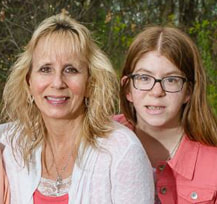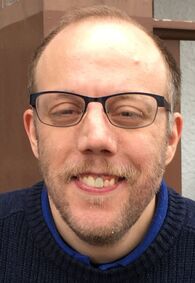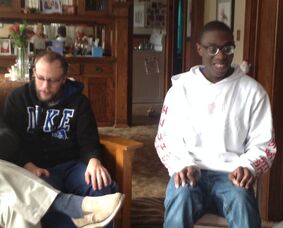|
A Chance To Grow provides a wide range of services designed to help people at all levels of ability reach their optimal growth. Our focus on brain function affords us the opportunity to offer many approaches that are designed to complement each other and improve quality of life. One family has been with ACTG since its beginnings, and their journey with us – beginning with Boost-Up, the program that is the basis for most of our programming, to clinical services, to PCA services. Their story provides insight into the impact of everything we do.
When ACTG began to explore the use of neurofeedback, a brain-training approach, Michelle was excited, and before long, she launched what became our Neurotechnology Program. What is Neurotechnology?
What are Home-Based Services? Michelle has made sure that her son and grandchildren participated in everything ACTG had to offer them. “Scott had auditory therapy, vision therapy and speech/language therapy here. Mike and Kyrie too, and also OT. And Summer Boost-Up.” She also made sure they got a lot of neurofeedback. “I think it built more brain pathways. All the things ACTG does is trying to encourage brain pathways, Neurofeedback was one way to try that.”
Scott, Michael and Kyrie will always have challenges, but the therapies received thanks to Clinical Services, Home-Based Services and Neurotechnology have had a substantial impact. Scott initially was very slow in speech, and while he still has trouble, his ability to pick up vocabulary increased. Michael, who was visually impaired at birth, has improved, thanks to the stimuli provided in vision therapy. Both Michael and Kyrie thrived in good school programs and continue to learn. ACTG helped all three build the foundation for continued growth. “You say ‘developmental delays’ but I say ‘delay.’ Because they are still making strides,” says Michelle. Because of her experiences providing Boost-Up, Neurofeedback and PCA services for her family, Michelle does not think about them in terms of their limitations. “If you have a child with a disability, you have to use their strengths.” She notes, “It’s just a matter of standing back and giving them room to be who they are. Talk to them, give them the opportunity, that’s really important to them. Respect different ways of knowing, give them the opportunity to learn.” When he was in school, “Scott was so curious about so many things that I could never get anybody to understand. He couldn’t read the stuff, he couldn’t take the test, but he learned. He learns by listening. He had all these difficulties with our traditional ways of getting information. For example, he can look at a number, he can’t tell you the name of that number, but if I were to put a 5 and a 3 on the paper, he couldn’t write the 8, but if I put 7,8,9 underneath, he could circle the 8, he knew the concept. It’s the same with letters. Now he is a fount of information, he learned to get himself around the Internet without being able to read and write. Now he’s reading better than he ever has.” Like Scott, Mike and Kyrie keep on growing and learning, albeit in nontraditional ways. They love sports and have participated in Special Olympics, honing their skills with hours of practice. Kyrie, now 18, is still in a project-based school that allows him to explore his natural interests at his own pace, and where he can stay through transition. Mike, now 27, is interested in cooking. As with Scott, he knows a lot, but is less communicative than Kyrie. “His receptive information is much more than his expressive,” says Michelle. Thanks to ACTG’s Clinical and Neurofeedback Services, all three have continued to make gains, and thanks to our PCA services, they have been able to do so with the love and support of those who know them best, exploring the world around them and enriching the lives of everyone around them.
0 Comments
 Sharon and Samantha Sharon and Samantha It’s difficult to truly understand the challenges that accompany a traumatic brain injury; not only for the affected individual, but for the family as well. The life-changing diagnosis can leave parents feeling alone, uncertain and frightened about what the future holds. Such is the case with Sharon and her daughter, Samantha, who was born with anoxia (a lack of oxygen to the brain), which resulted in an encephalopathy that damaged the brain’s speech center. Samantha was unable to utter an understandable word until she was four years old. As she grew into adolescence, Samantha faced countless struggles to develop social, planning and judgment skills. Daycare and special education classes often didn’t meet her individual needs. Ten years of speech therapy resulted in dismissive attitudes from therapists who thought she’d reached her maximum potential. “It’s hard for people, and even some therapists, to understand a brain-related disability,” said her mother. “The automatic assumption that they’re intellectually impaired couldn’t be further from the truth.” Sharon, a registered nurse of more than 30 years, said that Samantha comprehends and understands, and that it’s important that she not be treated at a lower level. “Don’t ever tell a parent their child has reached his or her maximum potential!” Samantha’s injury also caused fine and gross motor deficits that made routine daily activities unmanageable without constant care. Aside from younger sister, Alexis, Sharon and her husband Bill were totally responsible for Samantha’s round-the-clock care. “Those entire 19 years were a challenge, but we did what any parents would do for their child,” said Sharon. “After she graduated from high school, Samantha tried several different vocational programs but none were a good fit and this left her with too much unstructured time during the day. We became quite concerned about her safety and vulnerability.” Early in her nursing career (30 years ago), Sharon worked as an RN with a PCA agency so she understood that in-home care was a complicated process, requiring a certain level of comfort and communication between agency and client. Despite this knowledge, she felt like she was venturing into the unknown in searching for assistance with Samantha’s care. That search led her to A Chance To Grow, where she learned about the agency’s custom care plans for children and adults. “I saw the wealth of services they offered - not just PCA services - and it was clear they took a vested interest in all aspects of a child’s care,” said Sharon. “The first time I came in, I picked up a list of symptoms they treat and was shocked to find that it perfectly described my daughter! No doctor or therapist had ever described my child in this way.” Soon after her initial visit, Sharon discovered the Home-Based Services department was hiring a nursing position. “I realized I could be my daughter’s PCA and work for this wonderful agency at the same time,” she said, “I knew immediately this was the place for us to be.” In 2014, Sharon joined the ACTG team as an RN Case Manager, responsible for supervising PCAs, meeting with families and creating custom care plans. She and Alexis also serve as Samantha’s PCA, helping her complete daily living activities, participate in community social functions, and learn independent living skills. Sharon sees growth in the little things Samantha does; picking out her own clothes, making her own purchases at the store, or washing the dishes. “There’s no nice timeline,” said Sharon. “Every day with Samantha is different, but she continues to grow and make progress…but it’s on her timeline. A Chance To Grow understands that and has embraced her for who she is and the strengths she has.” That’s not to say there aren’t difficult days. Sequencing activities and social boundaries are still a challenge, but through ACTG’s PCA program, Sharon is able to help Samantha face those obstacles in a supportive environment. “It’s mutually beneficial to be able to meet the needs of my daughter and support other families’ needs too,” Sharon said. “ACTG makes such a difference in the lives of its clients. I get so much enjoyment developing relationships with families and helping them and their loved ones navigate difficult situations.” Sharon strongly recommends ACTG’s PCA program to families seeking in-home care for their loved ones. “At A Chance To Grow, we’re so focused on our clients.” she said. “From communication to paperwork, we are all attentive and aware of the comfort and flexibility that families like ours need. Most importantly, ACTG accepts your knowledge of your child-- like no one else can. It’s been an amazing partnership.” |
success story category:
All
WE LOVE HEARING FROM YOU! |


